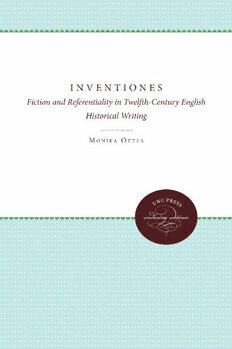
Inventiones: Fiction and Referentiality in Twelfth-Century English Historical Writing PDF
294 Pages·1996·3.083 MB·English
Most books are stored in the elastic cloud where traffic is expensive. For this reason, we have a limit on daily download.
Preview Inventiones: Fiction and Referentiality in Twelfth-Century English Historical Writing
Description:
Combining literary theory and historiography, this text explores the relationship between history and fiction in the Latin literature of 12th-century England. The beginnings of fiction have commonly been associated with vernacular romance, but this book demonstrates that writers of Latin historical narratives also employed the self-referential techniques characteristic of fiction. Beginning with "inventiones", a genre dealing with the discovery of saints' relics, Otter reveals how exploring the fundamental problems of writing history and the nature of truth itself leads monastic or clerical Latin writers to a budding awareness of fictionality. According to Otter, accounts of conquests, treasure hunts, descents into underground worlds, and efforts (usually unsuccessful) to retrieve subterranean objects serve as self-referential metaphors for the problems of accessing and retrieving the past; they are thus designed to shake the reader's faith in historical representation and highlight the textuality of the historical account. Otter traces the self-conscious use of fictional elements within historical narrative throught he works of William of Malmesbury, Geoffrey of Monmouth, Gerald of Wales, Walter Map and William of Newburgh.
See more
The list of books you might like
Most books are stored in the elastic cloud where traffic is expensive. For this reason, we have a limit on daily download.
